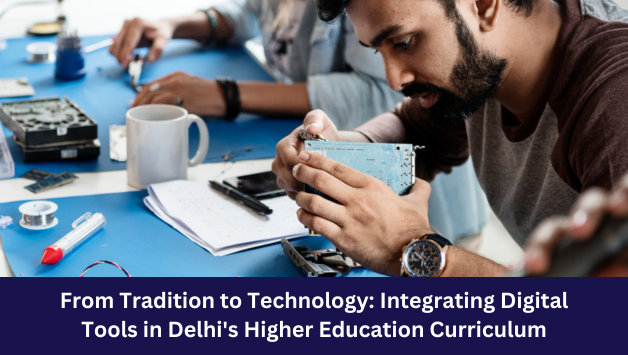Introduction:
In an increasingly digital world, the integration of technology in higher education has become essential to meet the evolving needs of students and prepare them for success in the modern workforce. Delhi, as a hub of education in India, is witnessing a shift from traditional teaching methods to innovative digital tools across its higher education institutions. With the support of leading institutions like the Delhi Institute of Higher Education (DIHE) is the management institutes near me, educators are embracing technology to enhance teaching and learning experiences.
Evolution of Higher Education:
Traditionally, higher education in Delhi has relied on traditional classroom lectures, textbooks, and assessments. However, with advancements in technology and changes in student preferences, colleges offering programs are increasingly incorporating digital tools into their curriculum. This transition reflects the recognition of the importance of digital literacy and the need to equip students with skills relevant to the digital age.
Digital Learning Platforms:
One of the most prominent trends in higher education is the adoption of digital learning platforms. Colleges are leveraging platforms such as Moodle, Canvas, and Google Classroom to facilitate online learning, collaboration, and assessment. These platforms provide students with access to course materials, interactive resources, and virtual classrooms, enabling them to engage with course content at their own pace and convenience.
Blended Learning:
Blended learning, which combines traditional face-to-face instruction with online components, is gaining traction in Delhi's higher education institutions. Colleges offering PGDM programs are incorporating elements of blended learning to enhance flexibility and accessibility for students. By combining in-person lectures with online discussions, videos, and quizzes, educators can cater to diverse learning styles and create a more engaging and interactive learning experience.
Flipped Classroom:
The flipped classroom model, where students review course materials independently before attending class for discussion and application, is another innovative approach being embraced by institutions. By flipping the traditional lecture format, educators can maximize class time for active learning activities, problem-solving, and collaborative projects. This model encourages student engagement, critical thinking, and peer interaction, ultimately leading to deeper learning outcomes.
Virtual Laboratories and Simulations:
In fields such as management and business administration, virtual laboratories and simulations are valuable tools for experiential learning. Colleges offering PGDM programs are integrating virtual simulations and business games into their curriculum to provide students with hands-on experience in decision-making, problem-solving, and strategic planning. These immersive learning experiences replicate real-world scenarios and enable students to apply theoretical concepts in practical settings.
Data Analytics and Artificial Intelligence:
As data becomes increasingly central to decision-making across industries, colleges are incorporating courses on data analytics, machine learning, and artificial intelligence into their curriculum. By teaching students how to collect, analyze, and interpret data using digital tools and techniques, educators can prepare them for careers in data-driven fields such as marketing, finance, and operations management.
Challenges and Considerations:
While the integration of digital tools offers many benefits, it also presents challenges and considerations for educators and institutions. These include issues related to digital equity, accessibility, privacy, and security. Colleges are addressing these challenges by ensuring that digital resources are inclusive, user-friendly, and compliant with relevant regulations and standards.
Conclusion:
The integration of digital tools in Delhi's higher education curriculum represents a transformative shift towards more flexible, interactive, and personalized learning experiences. With the support of institutions like DIHE is the top management colleges in Greater noida, educators are leveraging technology to enhance teaching effectiveness, student engagement, and learning outcomes. By embracing innovative approaches such as digital learning platforms, blended learning, flipped classrooms, virtual simulations, and data analytics, colleges are preparing students for success in the digital age and empowering them to thrive in a rapidly evolving global economy.


